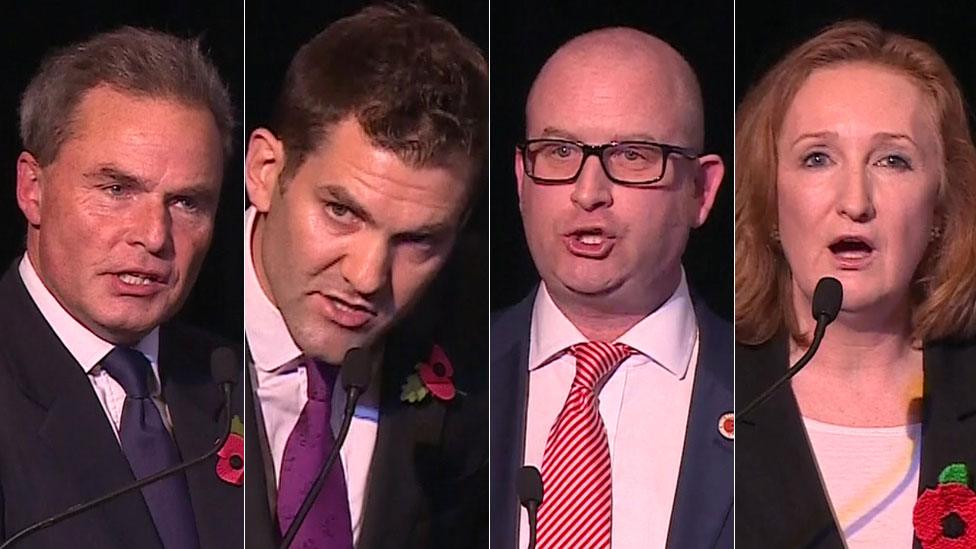UKIP hustings: Can the party unite?
- Published

UKIP candidates (L-R) Peter Whittle, John Rees-Evans, Paul Nuttall and Suzanne Evans
Introducing the first official hustings of UKIP's leadership contest, chairman Paul Oakden reflected that it had been a "challenging few weeks" for his party.
In the past month, it has lost its new leader after 18 days and seen an MEP resign after a much-publicised fracas in Strasbourg.
This came after months of infighting and tussles between rival factions within the party.
So rather than basking in EU referendum glory, the question of reuniting UKIP was high on the agenda in front of about 200 party activists in central London.
Former deputy leader - and now leadership candidate - Paul Nuttall said he would "let bygones be bygones", and that the party had to "forgive but not forget".
"Let's stop knocking lumps out of each other," he urged, vowing to publish proposals for constitutional reform of the party to "tighten everything up".
'Real enemy'
Fellow candidate Suzanne Evans also called for changes to the party machinery, saying the ruling National Executive Committee had to be reformed and be made more open and accountable.
"Our members are sick of this," added the former deputy chairwoman, who was unable to take part in the previous contest because of her suspension from the party.
"Let's focus our fight on the real enemy."
Businessman John Rees-Evans offered the most radical reform to party structure - an online balloting system that would see UKIP's policies set by its membership.
'Same hymn sheet'
Unlike the more upbeat assessment of his rivals, Mr Rees-Evans provided a pessimistic outlook on the party's current predicament, saying it was in a "crisis", short of funds and with a declining membership.
Culture spokesman and London Assembly member Peter Whittle called for "some form of collective responsibility" from the party.
"We've got to be singing from the same hymn sheet when we go out into the public," he added.
Candidates also set out their policy priorities, and aside from Brexit - where they all agreed on taking the fastest route out of the European Union - immigration, combating Islamic extremism and curbing the rise of Sharia courts were common themes.
Flags in schools
There were no questions on the death penalty, which divided the panel at an earlier LBC debate, external.
Mr Nuttall vowed to replace Labour as the "patriotic voice of the working class", while Ms Evans said it had to broaden its appeal to more women and ethnic minority voters, vowing to put more "kippers" in schools and teaching unions to ensure pupils are taught "to be proud of Britain".
Mr Whittle said every school should display the union jack and a picture of the Queen.
Mr Rees-Evans said he would aim to increase the party membership to 500,000, warning that the other candidates would continue UKIP's "current demise".
That was as close as we got to criticism of a fellow panellist - and there was no sign of dissent in the audience, who applauded each candidate after every question, with Mr Nuttall getting a standing ovation from some sections.
It was left to Mr Oakden to close proceedings, with a nod to ex-UKIP MEP Steven Woolfe's parting attack on the state of the party.
"I think anyone who thinks the party is in a 'death spiral' should have been here tonight," he said.
UKIP's new leader will be announced on 28 November, with the deadline for ballots to be returned on 25 November.